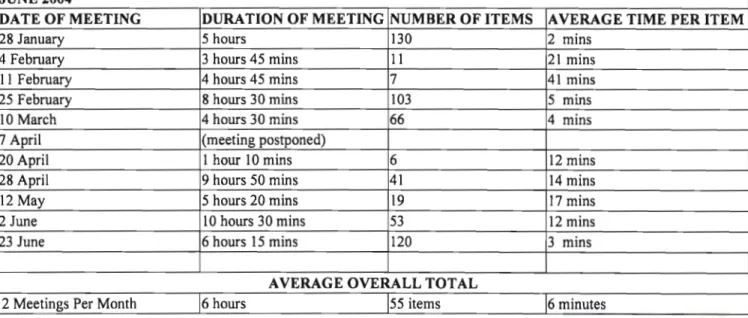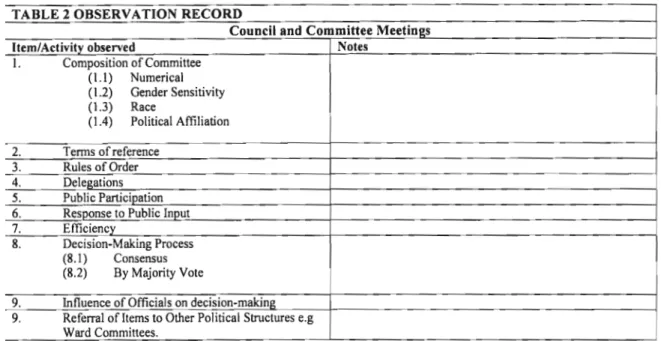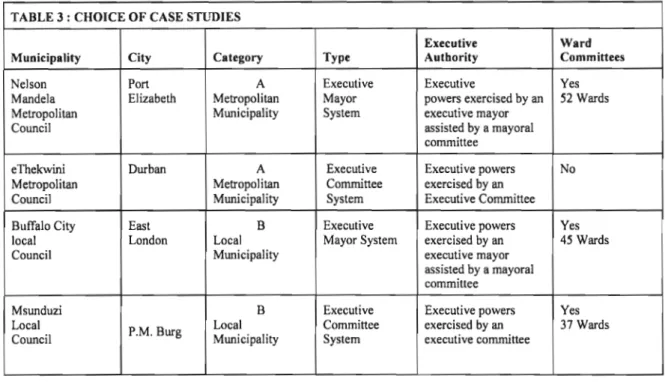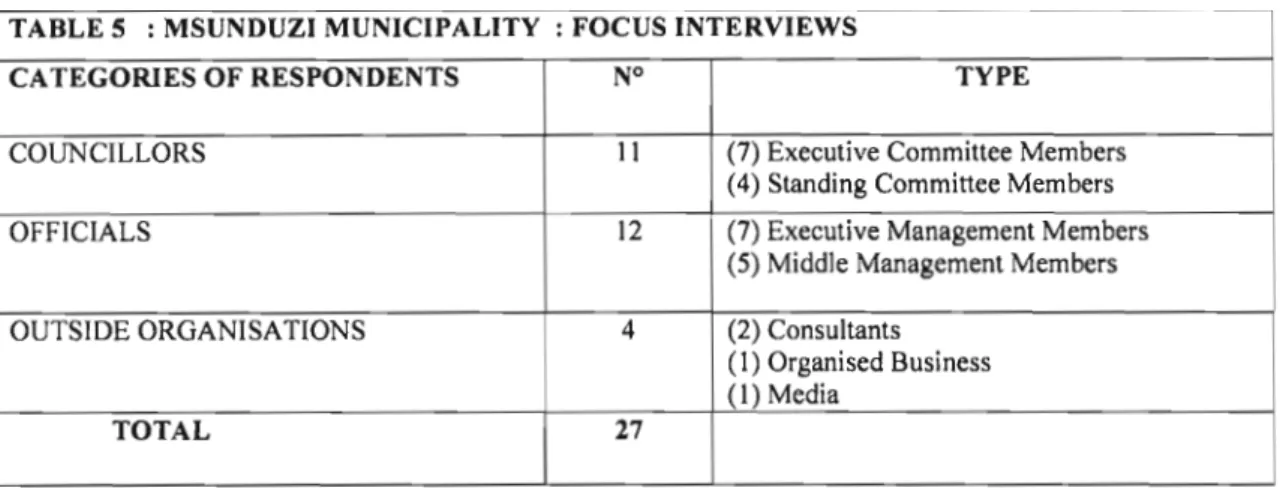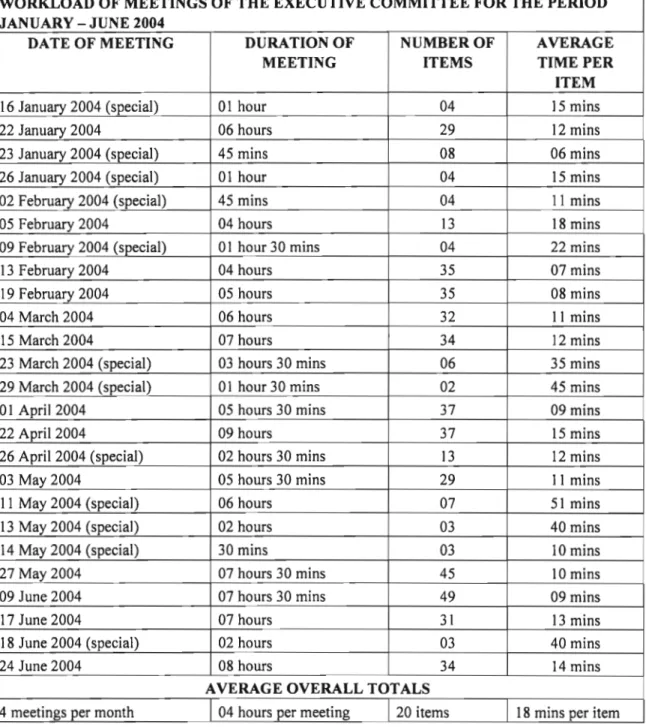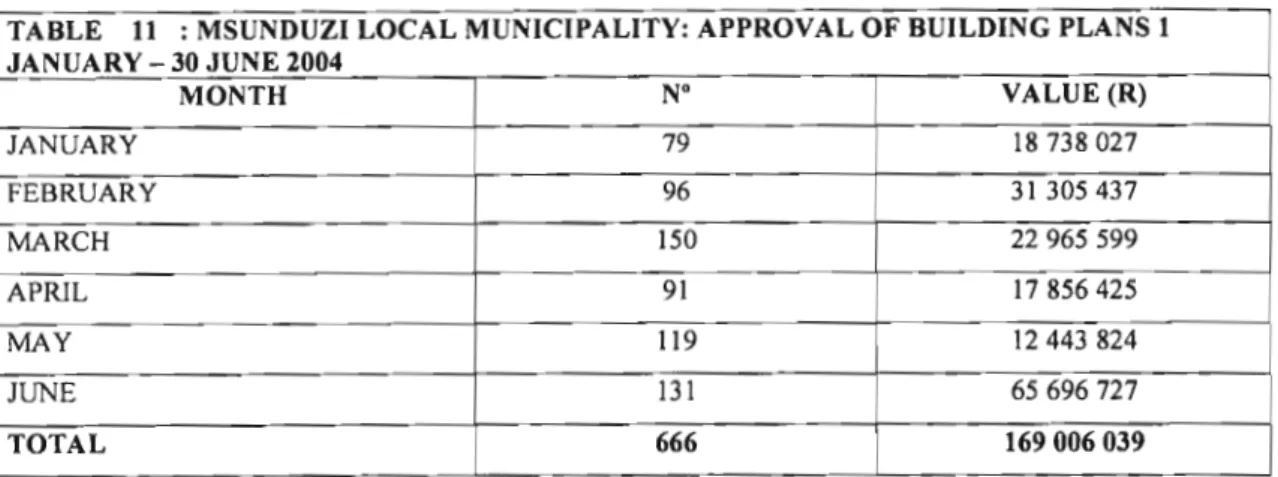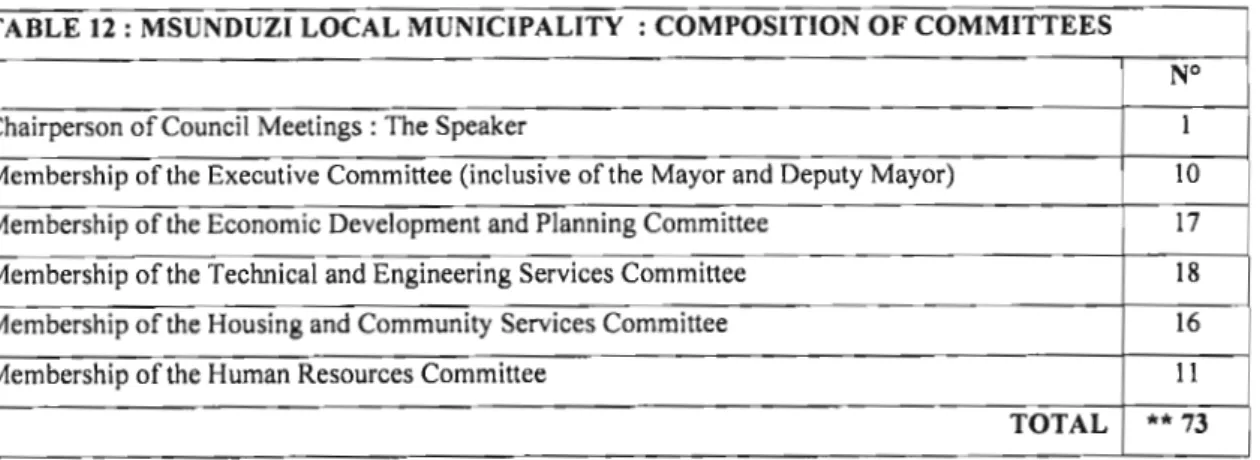Msunduzi Local Municipality: Executive committee: Effectiveness assessment 87 Msunduzi Local Municipality: Frequency, duration and workload of meetings in the executive board. Ethekwini Metropolitan Municipality: Administrative Structure 145 Ethekwini Metropolitan Municipality: Executive Committee: Effectiveness Assessment 145 Ethekwini Metropolitan Municipality: Frequency, Duration and Workload of Executive Committee Meetings for the Period 1 January - 30 June 2004 146 Comparative Effectiveness Analysis: : Msunduzi and Buffalo City Local.
LOCAL GOVERNME T IN THE APARTHEID ERA
Segregation
What gave rise to the exclusion of Africans from local government in the so-called white urban areas. By the 1920s, Africans moved to white urban areas in search of work in the United States.
Seereeation vs Apartheid
In addition to the Act on Group Areas from the previous paragraph, other legislation was passed that reinforces the government's policy of segregation. Another imperative of the influx control strategy was to limit as much as possible the number of Africans in urban areas.
THE TRANSFORMATION OF LOCAL GOVERNMENT
New Municipal Legislation
The rights and obligations of municipal councils, those of local communities and those of municipal administrators are laid down in law. Municipalities are authorized by law to provide services through service agreements with external mechanisms in a competitive bidding system.
THE NEW LOCAL GOVERNMENT SYSTEM: CHALLENGES AND CHANGES
Participatory Governance
Republic of South Africa: The Local Government Municipal Demarcation Act, 1998, (Act of 27 of 1998), Pretoria, Government Printer, 1998. Carrim Y.: Bridging the gap between ideal and practice: Challenges of the new local government system,ANC Journal , Threshold, No. 1O, March, 2001, p.
STATEMENT OF THE PROBLEM AND FORMULATION OF THE OBJECTIVES
EFFICIENCY
Various sources have been examined in an attempt to capture the meaning of efficiency in the context of municipal decision-making. Simply put, the less time local government decision-making takes, the more efficient it is.
DEMOCRACY
- Inclusivity
- Transparency
- Accountability
- Participation
Therefore, transparency is the democratic center of the relationship between the external and internal moments in the decision-making process. Accountability is relevant to the external aspect of municipal decision-making, insofar as it characterizes the relationship between neighborhood committees and the community.
Democracy
The effectiveness of municipal decision-making is likely to be inversely proportional to the degree of .. democracy manifested in the decision-making structures and processes of that municipality. This research project seeks to interrogate the changes in local government specifically to the extent that they affect decision-making structures and processes.
THE RESEARCH QUESTIONS
Efficiency
With these issues in mind, it is necessary to take a step back to consider how changes in local governance and their impact on the decision-making process can best be investigated. To what extent do different municipal decision-making models promote efficiency in decision-making? Specifically, four levels of decision-making will be addressed, namely the council, the executive, the permanent committee and administrative decision-making.
Municipal councils, regardless of whether they are big cities, local areas or districts, have been given original decision-making powers as contained in the constitution.
Democracy
This research will accordingly examine the different decision-making models that are in operation in municipalities in South Africa and will specifically pay attention to the efficiency achieved by each of these models. When dealing with decision-making processes, the research will focus on powers and functions, statutory requirements, delegation of authority, work flow, time frames, etc. The research will focus on the extent to which these requirements are manifested in the decision-making structures and processes of local government decision-making.
The research will therefore examine the composition, powers and functions of neighborhood committees and, more importantly, the influence they exert on formal municipal decision-making structures and processes.
Efficiency versus Democracy
The research will attempt to demonstrate that compliance with these requirements by municipalities will have a negative impact on the efficiency of the decision-making system. More meetings require more time, which in turn will slow down the efficiency of the decision-making system. Fourth, greater involvement of the community and community organizations in local government affairs will negatively impact the level of efficiency in municipal decision-making.
For example, the efficiency of the decision-making system will be delayed if all matters requiring a decision are first passed through a ward committee system.
METHODOLOGIES
The Research Model
- The Functionalist Systems Approach
- The Interpretive Systems Approach
- The Emancipatory Systems Approach
Due to the nature of this research project, most of the research will use a hard systems approach. Using an interpretive systemic approach, we will determine the impact of new municipal legislation on decision-making. Therefore, with this methodology, we will determine the involvement of the municipality in promoting the social development of the community and the emancipation of the individual through the participation of the community in municipal decision-making.
The new local government system requires a change in organizational culture.
METHODS AND TECHNIOUES OF DATA COLLECTION
Note is taken of the fact that municipal government and therefore municipal decision-making takes place in a political environment. Because municipal decision-making, such as the focus of this dissertation, is an activity that takes place during meetings, the study will include observation during meetings as one of the means of data collection. Where possible, in all case studies, meetings of the council, management, standing committees and ward committees will be attended for observation purposes.
For example, in terms of efficiency, attention will be paid to the size of the decision-making structure, mandate, standing rules, delegation of authority, frequency and duration of meetings, workload, etc.
THE SCOPE AND LIMITATIONS OF THE STUDY
The category, species, size, etc. appears from the executive order in accordance with Section 12 of the Building Act, which establishes the municipality. The following municipal types are identified in the building act's seven: -. a) Collective executive system that allows the exercise of executive authority through an executive committee where the executive management of the municipality is assembled. It is different from municipality to municipality how community involvement in decision-making is facilitated, but the requirements for this to happen are contained in the new municipal legislation, especially the fourth chapter of the System Act.
Only three activities have therefore been selected, namely processes leading up to the adoption of the annual budget and adoption of statutes and approval of building plans.
PARTICIPANTS
Firstly, participants from the elected representatives will include the Mayor and/or Deputy Mayor; and/or the speaker; and the members of the executive committee or mayor's committee, ward and PR councilors (councillors elected by proportional representation). Second, participants from the ranks of civil servants will include the city manager; and/or the manager of the city manager's office; senior and middle management; and specialized staff (eg legal advisers, secretariat managers, media liaison officers, etc.). The research will have as its starting point that effectiveness in decision-making is measured in relation to the time it takes to make a decision, and that democracy is operationalized in relation to the principles of inclusivity, transparency, accountability and participation.
In this chapter I intend to deal, first, with the application of the research methodology, second, with questions of orientation, third, with the results of the empirical research on efficiency and democracy as they are expressed in decision-making structures and processes . Msunduzi Municipality and fourthly to draw conclusions from the results of the research.
APPLICATION OF THE RESEARCH METHODOLOGY
It was necessary to supplement the data obtained from the review of official documents with data from focus interviews and observations in meetings. While document review as a data collection method falls under the hard systems methodology and is concerned with qualitative and quantitative research, a soft systems approach has been used to focus interviews and meeting observations and is mainly concerned with qualitative research. In accordance with the research design, a number of elite interviewees or key informants were identified from among elected representatives (councillors); administration, community (officials) and civil society. The local newspaper and the Chamber of Commerce were selected as representatives of civil society) A total of 27 focus interviews were conducted, the details of which can be found in Appendix 9, while a summary of the distribution of the interviewees in the three categories mentioned above is contained in the table the following:-.
Details of the meetings attended for observation purposes are contained in appendix 10, while a summary is included in the table that follows:-.
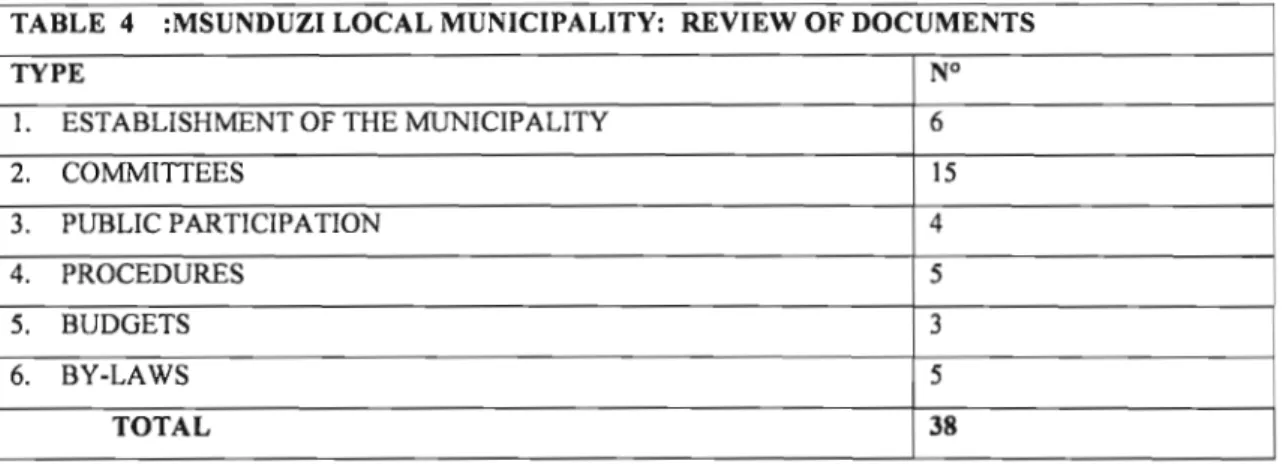
ORIENTATION
To begin with, it was necessary to trace and investigate the details relating to the establishment of the Msunduzi Municipality. Having uncovered the details regarding the establishment of the municipality, I now move to the. Both the Mayor and Deputy Mayor are elected by the Council from among the members of the Executive Committee.
The table below contains the names and party affiliation of the councilors currently serving on the Executive Committee.
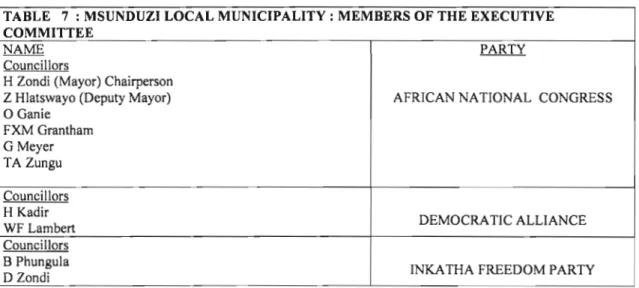
RESEARCH FINDINGS
Efficiency
Reference is made to the macro-restructuring of the organization because, among other things, it has an impact on the decision-making process. The research was extended to include decision-making at the administrative level of the municipality. Whether ward committees are consulted or not depends entirely on the decision of the ward councillor.
One of the main means of involving the public in municipal decision-making is through neighborhood committees.
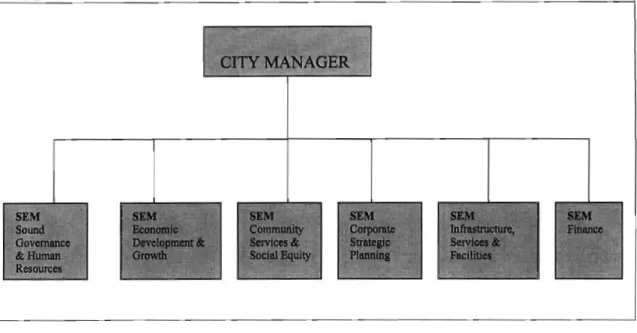
CONCLUSION
The methodology used for decision-making research in Msunduzi was also used in relation to the second case study, Buffalo City Local Municipality. For the following reasons, it was not possible to participate as an observer in any meeting of decision-making structures. In other words, the Mayor's Committee meetings are closed to the public and the media.
The analysis of the data collected was done on the same basis as for the Msunduzi Municipality, namely efficiency and democracy, but I begin with a brief orientation to the establishment, scope, structure and composition of the Buffalo City Local Municipality.
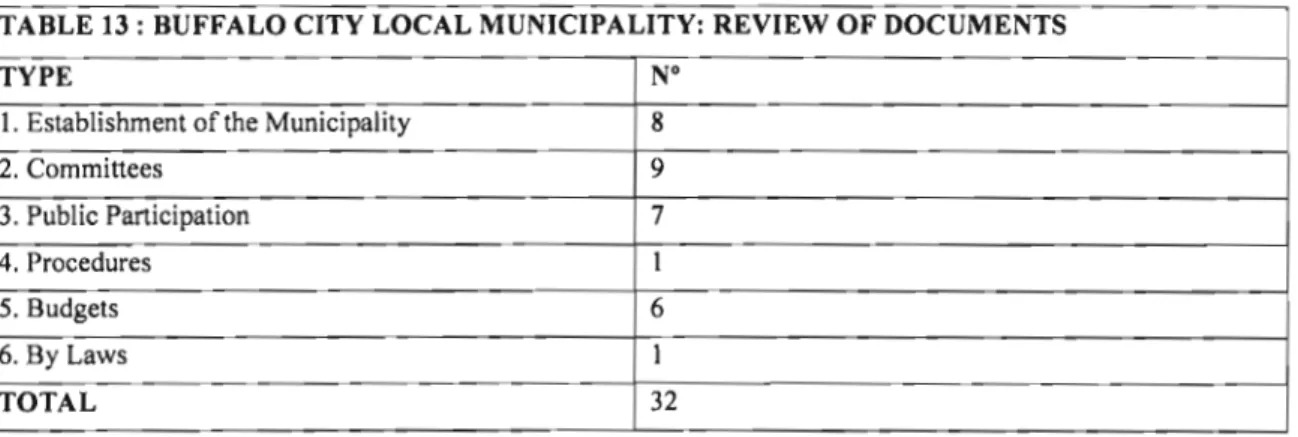
ORIE TATION
The Buffalo Mayor's Committee fulfills this requirement in comparison to the Executive Committee of Msunduzi Municipality. On the negative side, the activities of the Mayor's Executive Committee in the Municipality are not transparent. The members of the Executive Committee are charged with the responsibility of chairing the meetings of the Standing Committees.
After that, the recommendations of the Standing Committee are placed on the agenda of the Executive Committee. As shown in the table above, the standing committees are chaired by members of the Executive Committee. Historically, meetings of the full Council were held in the Council Chamber at the City.
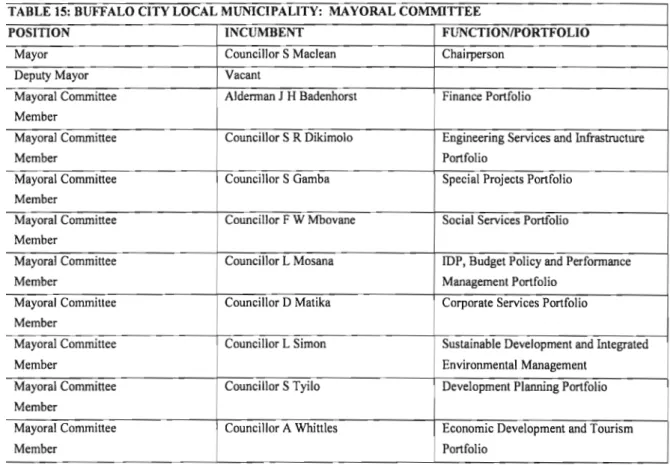
RESEARCH FIND! GS
In dealing with inclusivity, the composition of the executive authority is the first focal point. General meetings of the eThekwini Municipality's Executive Committee are attended only by the City Manager. The establishment of the Nelson Mandela Metropolitan Municipality was also accompanied by the restructuring of the administration.
The Nelson Mandela Metropolitan Municipality claims to pay close attention to the views of residents of the metropolitan area.
